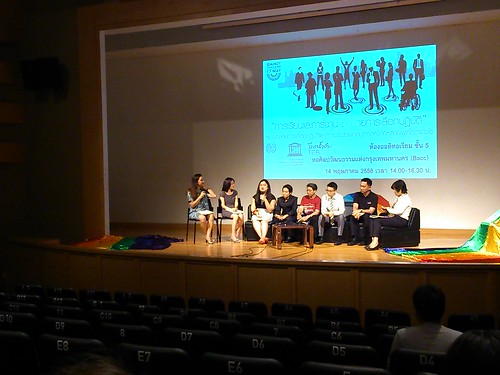LGBT activists from all walks of life point out that discrimination against LGBT (Lesbian, Gay, Bisexual, and Transgender) is still prevalent in Thailand although the Asian country promotes itself as a paradise for all sexual orientations, gender identities and expressions (SOGIE).
UNESCO and the International Labour Organisation (ILO) on Thursday afternoon organised a public discussion entitled ‘Breaking the Continuum of Discrimination and Violence in Education and Employment’ to present findings about discrimination against LGBT in schools and workplaces in Thailand.
The discussion was organised as a part of a week-long event to celebrate International Day Against Homophobia, Transphobia, and Biphobia (IDAHOT) which will be on 17 May. It was held at the Bangkok Art and Culture Centre.
At the event, panellists who are active members and activists in the LGBT communities in Thailand shared their experience with the audience on the discrimination which they have experienced because of their SOGIE.
Kath Khangpiboon, a member of the Thai Transgender Alliance (TIGA), who had her application for a lecturer position at the Faculty of Social Administration of Thammasat University rejected despite her distinguished profile, said that LGBT always have to try harder to prove themselves in comparison to straight males or females.
Elected as student president in both her primary school and high school years, Kath said “[In schools] most teachers believe that smart kids would only be straight [male or female]”. She added “We always have to try harder to prove our capabilities.”

Panellists discuss discrimination against LGBT in schools and workplaces in Thailand at the event to celebrate International Day Against Homophobia, Transphobia, and Biphobia (IDAHOT).
Another panellist, Phakwilai Sahunalu, a civil society worker of Lam Pork Irrigation Environmental Management from Thailand’s northeast, told the audience that she was almost raped by a group of her co-workers once because they thought that she could become a straight female if they did so.
She added that when she first applied for a job in agrarian development at a government agency in the northeast region, her employer looked down on her and said that the job was more suitable for men.
Naiyana Supapung, Director of the Teeranat Kanjanauksorn Foundation, an organisation which promotes LGBT rights, and a former member of the National Human Rights Commission (NHRC), said that while she was working for the NHRC many NHRC staff sympathised with the marginalisation of the LGBT community, but many chose not to engage in the issue because of fear that they might be viewed as LGBT themselves.
She pointed out that it is important that the media and all LGBT organisations work together to raise awareness on issues faced by LGBT communities and to undo the misconception that there are only two natural sexes.
One of the participants in the discussion who used to work in the human resource department of one company added that there is also a ‘reverse discrimination’ resulting from LGBT stereotypes. She said that one of her former employers tended to hire transgenders and lesbians because, unlike straight women, they are physically stronger and do not ask for maternity leave.
In addition to the LGBT panellists who shared their experience in the discussion, Busakorn Suriyasarn, a researcher and ILO consultant on discrimination against LGBT in employment, stated that in Thailand, LGBT persons still face many forms of discrimination in schools and workplaces, ranging from verbal abuse to sexual harassment and physical abuse.
She pointed out the LGBT persons with strong or noticeable SOGIE tend to face the worst discrimination in schools and workplaces, especially in big corporations, government agencies, and single-sex schools.
“LGBT persons continue to face discrimination in education and jobs in many parts of their life, which restricts their career choices,” said Busakorn.
According to research conducted by UNESCO on discrimination against LGBT in schools, 56 percent of students who identify themselves as LGBT in Thailand reported that they had experienced some form of abuse because of their SOGIE in the month before the research was conducted.
Moreover, the research pointed out that 25 percent of students who were perceived as LGBT have been bullied in schools.
At the end of the discussion, the panellists agree that although Thailand has taken a major step forwards in acknowledging LGBT rights as the government will enact the Gender Equality Bill in September 2015 to prevent gender discrimination, discrimination against LGBT persons in the future might become more subtle after the bill is enacted.
Prachatai English is an independent, non-profit news outlet committed to covering underreported issues in Thailand, especially about democratization and human rights, despite pressure from the authorities. Your support will ensure that we stay a professional media source and be able to meet the challenges and deliver in-depth reporting.
• Simple steps to support Prachatai English
1. Bank transfer to account “โครงการหนังสือพิมพ์อินเทอร์เน็ต ประชาไท” or “Prachatai Online Newspaper” 091-0-21689-4, Krungthai Bank
2. Or, Transfer money via Paypal, to e-mail address: [email protected], please leave a comment on the transaction as “For Prachatai English”
